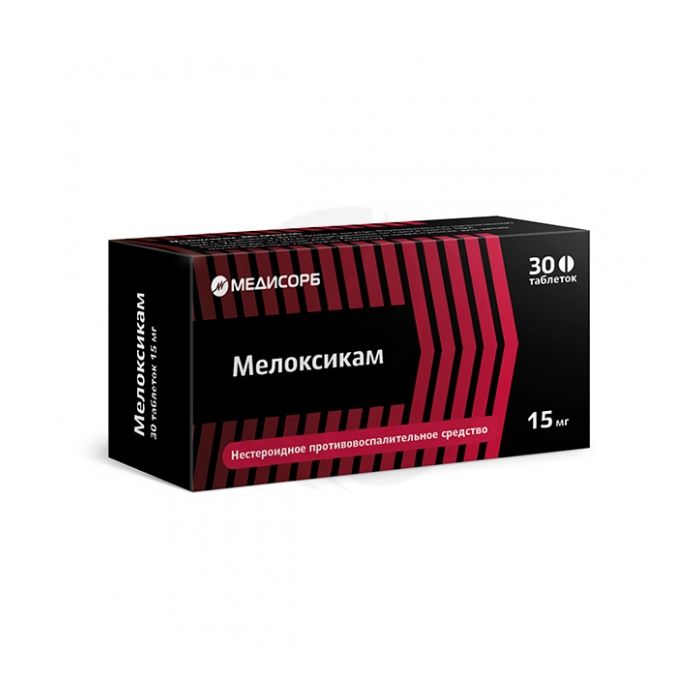Meloxicam tablets 15mg, No. 30
Expiration Date: 11/2025
Russian Pharmacy name:
Мелоксикам таблетки 15мг, №30
Osteoarthritis
rheumatoid arthritis
ankylosing spondylitis (ankylosing spondylitis)
inflammatory and degenerative diseases of the joints accompanied by pain
Inside 7.5Ц15 mg 1 time / day. The maximum daily dose is 15 mg.
Tablets are light yellow, flat-cylindrical, round.
1 tab.
meloxicam 15 mg
Excipients: lactose monohydrate (milk sugar) - 161 mg, povidone (polyvinylpyrrolidone) - 8 mg, potato starch - 14 mg, magnesium stearate - 2 mg.
Hypersensitivity to meloxicam;
hypersensitivity (including to other NSAIDs);
complete or incomplete combination of bronchial asthma, recurrent polyposis of the nose or paranasal sinuses, angioedema or urticaria caused by intolerance to acetylsalicylic acid or other NSAIDs due to the existing likelihood of cross-sensitivity (including history);
erosive and ulcerative lesions of the stomach and duodenum in the acute stage or recently transferred;
inflammatory bowel disease (Crohn's disease or acute ulcerative colitis);
severe liver and heart failure;
severe renal failure (if hemodialysis is not performed, CC <30 ml / min, as well as with confirmed hyperkalemia);
active liver disease;
active gastrointestinal bleeding, recent cerebrovascular bleeding or an established diagnosis of diseases of the blood coagulation system;
concomitant anticoagulant therapy, because there is a risk of intramuscular hematoma formation;
therapy of perioperative pain during coronary artery bypass grafting;
pregnancy;
lactation period (breastfeeding);
age up to 12 years (for oral administration),
inflammatory diseases of the rectum or anus;
recent bleeding from the rectum or anus
Carefully
History of gastrointestinal diseases (presence of Helicobacter pylori infection); congestive heart failure; renal failure (CC 30-60 ml / min); Ischemic heart disease; cerebrovascular diseases; dyslipidemia / hyperlipidemia; diabetes; concomitant therapy with the following drugs: anticoagulants, oral corticosteroids, antiplatelet agents, selective serotonin reuptake inhibitors; peripheral arterial disease; elderly age; long-term use of NSAIDs; smoking; frequent alcohol consumption.
Pharmacological properties:
Pharmacodynamics:
Meloxicam is a non-steroidal anti-inflammatory drug (NSAID), belongs to the oxicam class; has anti-inflammatory, analgesic and antipyretic effects.
The mechanism of action of NSAIDs is associated with the suppression of the activity of cyclooxygenase (COX), an enzyme that catalyzes the biotransformation of arachidonic acid into prostaglandins, prostacyclin (PGI2) and thromboxane (TxA2).
Meloxicam predominantly inhibits COX-2, an isoform involved in the biosynthesis of prostaglandins in the area of ??inflammation.
To a much lesser extent, meloxicam acts on COX-1, which is involved in the synthesis of prostaglandin, which protects the mucous membrane of the gastrointestinal tract (GIT), and takes part in the regulation of blood flow in the kidneys.
Meloxicam at a therapeutic dose does not affect platelet aggregation and clotting time.
Pharmacokinetics:
Meloxicam is well absorbed when taken orally, bioavailability is 89%.
Food intake does not affect the absorption of the drug.
The maximum concentration in the blood (Cmax) is 1.05 ?g / ml, the time to reach it (Tmax) is 4.9 hours, the half-life (T1 / 2) is 20.1 hours, and the clearance is 8.8 ml / min.
Stationary concentration (Css) is created on the 3-5th day.
The volume of distribution is about 10 liters.
Communication with plasma proteins (mainly with albumin) - 99.4%.
Meloxicam penetrates histohematogenous barriers, incl. placental, hematoencephalic and hematosynovial.
In the synovial fluid, 50% of the plasma concentration of the drug is found.
Meloxicam is completely metabolized to four pharmacologically inactive forms with the participation of cytochrome P450 peroxidase, isoenzymes CYP2C9 and CYP3A4.
It is excreted equally in urine and feces, unchanged - in trace amounts (0.2% in urine and 1.6% in feces).
Moderately expressed hepatic and renal failure have no significant effect on the pharmacokinetics of meloxicam.
In the elderly, the clearance is somewhat reduced.
There are no sex differences in the pharmacokinetics of meloxicam.
Side effect:
From the digestive system: dyspepsia, incl. nausea, vomiting, abdominal pain, diarrhea, constipation, flatulence, belching; erosive and ulcerative lesions of the gastrointestinal tract, perforation of the stomach or intestines, gastrointestinal bleeding (latent or overt); transient increase in the activity of hepatic transaminases, hyperbilirubinemia, hepatitis, esophagitis, stomatitis, gastritis, colitis, dry mouth.
From the side of the cardiovascular system: peripheral edema, tachyardia, increase or decrease in blood pressure, hot flashes, vasculitis.
From the side of hematopoiesis: anemia, leukopenia, thrombocytopenia.
From the respiratory system: bronchospasm, bronchial asthma with aspirin intolerance (unstable bronchial asthma).
From the side of the central nervous system: dizziness, headache, tinnitus, sleep disturbances (drowsiness / insomnia), disorientation, emotional lability, confusion, anxiety, depression.
From the urinary system: hematuria, albuminuria, increased creatinine levels, acute renal failure.
Allergic reactions: anaphylactoid and anaphylactic reactions, pruritus, skin rash, urticaria, exudative erythema multiforme, Steven-Johnson syndrome, toxic epidermal necrolysis (Lyell's syndrome), photosensitivity.
Others: impaired taste, conjunctivitis, visual impairment (blurred), weakness, fever
If any of the side effects indicated in the instructions are aggravated, or you notice any other side effects that are not indicated in the instructions, inform your doctor.
If you notice manifestations of allergic reactions to any drug, such as: rash, itching, difficulty swallowing and breathing, swelling of the larynx and tongue, stop taking the drug immediately and consult a doctor.
Overdose
Symptoms: lethargy, drowsiness, nausea and vomiting, epigastric pain, possibly gastrointestinal bleeding.
Treatment:
Gastric lavage and standard supportive care.
Cholestyramine accelerates the elimination of meloxicam.
No antidote known.
Influence on the ability to drive vehicles and work with mechanisms:
Special studies regarding the effect of the drug on the ability to drive vehicles and mechanisms have not been conducted.
Care should be taken to drive a car and engage in other potentially hazardous activities that require a high speed of psychomotor reactions, due to possible adverse reactions from the central nervous system, such as visual impairment, drowsiness, dizziness.

